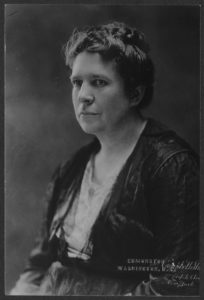
Florence Kelley
1859-1932
Florence Kelley was born on September 12, 1859 in Philadelphia, Pennsylvania. She was one of eight children, and the daughter of U.S. congressman William Darrah Kelley. Her father taught her about child workers, and several times took her to see young children working in steel and glass factories under dangerous conditions. These visits influenced Kelley in her pursuit and involvement in the welfare of children.
In 1876, Kelley enrolled at Cornell University. Unfortunately, due to chronic eyestrain as a result of childhood scarlet fever, she had to leave for two years. Kelley graduated in 1882, and continued her studies in Europe at the University of Zürich, where she was influenced by Karl Marx and the ideas of socialism. Studying in Europe helped Kelley form her ideas regarding the abuse of people in poor social conditions. In 1887 she published a translation of Friedrich Engels’s 1844 book The Condition of the Working-Class in England.
In 1891, Kelley worked for Chicago’s Hull House, alongside founder Jane Addams, Julia Lathrop, Ellen Gates Starr, and more. At the settlement house, Kelley’s initial job was to survey the working conditions in local factories. There, she found young children working in tenement sweatshops. Kelley presented the results of her findings to the State , resulting in the State Legislature bringing about the first law prohibiting employment of children under the age of 14. As a result of her findings, Kelley was appointed to serve as Illinois’s first Chief Factory Inspector under Governor John Peter Altgeld. To advance her credibility as an inspector, Kelley enrolled to study law at Northwestern University, graduating in 1894, and was successfully admitted to the Bar.
Women did not have the right to vote, they utilized social movements and speeches in order to reach their goals, “We can enlist the workingmen on behalf of our enfranchisement just in proportion as we strive with them to free the children”, Kelley believed that in order to end child labor, a compromise must be reached by working together to grant women the right to vote.
Kelley pushed Congress to pass the Keating-Owen Act of 1916, which banned the sale of products created in factories that employed children aged 13 years and under.
Florence Kelley died in the Germantown section of Philadelphia on February 17, 1932.